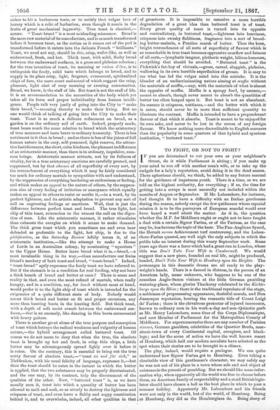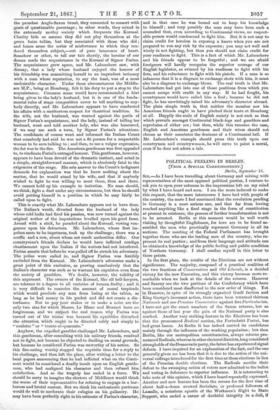TO FIGHT, OR NOT TO FIGHT ?
IF you are determined to cut your own or your neighbour's throat, do it while Parliament is sitting ; if you make up your mind to run off with another man's wife, or to take up the cudgels for a lady's reputation, avoid doing it in the dead season.. These aphorisms should, we think, be added to any future manual, for the guidance of impetuous youth. There is a time, so we are told on the highest authority, for everything ; if so, the time for getting into a scrape is most assuredly not included within the months of August or September. If Mr. Labouchere, for instance, had thought fit to have a difficulty with an Italian gentleman during the season, nobody except the few quidnuncs whose especial mission it is to be the purveyors of European scandal would ever- have heard a word about the matter. As it is, . the question whether the M.P. for Middlesex ought or ought not to have fought a duel with a certain Signor Farina, or of the Farinas, as the case• maybe, has become the topic of the hour. The Pan-Anglican Synod,. the Hermit versus Achievement turf controversy, and the Labou- chere-Farina quarrel, are well nigh the only subjects in which the: public take an interest during this weary September week. Some years ago there was a farce which had a great run in London, whose title was Don't Take Your Wife to Camberwell. We -would suggest that a new piece, founded on real life, might be produced,. headed, Don't Take Your Wife to Homburg upon the Heights. The personages in this domestic drama are all ready to the play- wright's hands. There is a damsel in distress, in the person of an American lady, name unknown, who happens to be one of the- countless Anglo-Saxon visitors at the little German gambling watering-place, whose glories Thackeray celebrated in the Kickle- burys upon the Rhine; there is the traditional reprobate of the stage, a nobleman of prepossessing appearance, doubtful morals, and Don Juanesque reputation, bearing the romantic title of Count Luigi de' Farina ; there is the chivalrous protector of injured innocence, known to ordinary men in his work-a-day and non-Quixotic garb- as Mr. Henry Labouchere, some time of the Corps Diplomatique, and now Member of Parliament for the Metropolitan County of Middlesex. For supernumeraries there are any number of Parisian viveurs, German gamblers, celebrities of the Quartier Breda, men- about-town of every Continental capital, croupiers, and black- legs ; and for the scene of action we have the well known resort. of Homburg, which half our modern novelists have selected as the spot where their stories are to be brought to a climax.
The play, indeed, would require a prologue. We can quite understand how Signor Farina got to Homburg. Even taking a- charitable view of this gentleman's character, we may safely say he was not out of his place in a town whose sole end and object of existenceis the pursuit of gambling. But we should like some infor- mation why, when apparently all the world was free to choose before them, an American family of respectability and a staid British legis- lator should have chosen a hell as the best place in which to pass a. summer holiday. Apparently Mr. Labouchere and his friends were not only in the world, but of the world, of Homburg. Being at Homburg, they did as the Homburgians do. Being sheep of the proudest Anglo-Saxon breed, they consented to consort with goats of questionable parentage ; in other words, they mixed in the extremely motley society which frequents the Kursaal. Charity bids us assame they did not play themselves at the green baize tables, but they associated with those who did ; and hence arose the series of misfortunes to which they ren- dered themselves subject,—out of pure innocence of heart. Somehow or other, to tell our tale shortly, the heroine of our drama made the acquaintance in the Kursaal of Signor Farina. The acquaintance grew apace, and Mr. Labouchere saw, with dismay, that a lady whose husband enjoyed the honour of his friendship was committing herself to an imprudent intimacy with a man whose reputation, to say the least, was of a most undesirable character. Under these circumstances the Middle- sex M.P., being at Homburg, felt it his duty to put a stop to the acquaintance. Common sense would have recommended a hint being given to the lady's husband, but it is one of the funda- mental rules of stage composition never to tell anything to any- body directly, and Mr. Labouchere appears to have conducted his affairs with a meritorious respect for theatrical tradition. So the wife, not the husband, was warned against the perils of Signor Farina's acquaintance, and the lady, instead of telling her husband, went and told another lady, who was also honoured, if we may use such a term, by Signor Farina's attentions. The confidante of course went and informed the Italian Count that somebody had said he was not a fit person for a respectable woman to be seen talking to ; and then, to use a vulgar expression, the fat was in the fire. The American gentleman was first appealed to, to vindicate Farini's outraged honour. This gentleman, however, appears to have been devoid of the dramatic instinct, and acted in a simple, straightforward manner, which is absolutely fatal to the exigencies of the stage. His sole answer to the Count's indignant demands for explanation was that he knew nothing about the matter, that he would stand by his wife, and that if anybody wished to fight he was willing to meet them, then and there. We cannot hold up his example to imitation. No man should, we think, fight a duel under any circumstances, but then he should avoid putting himself in a position in which he may fairly be called upon to fight.
This is exactly what Mr. Labouchere appears not to have done. The Italian's wrath, diverted from the husband of the lady whose cold looks had fired his passion, was now turned against the original author of the imputations levelled upon his good fame. Armed with a stick, he paraded about the Kursaal, vowing ven- geance upon his detractors. Mr. Labouchere, whose first im- pulses seem to be impetuous, took up the challenge; there was a scuffle and a row, about whose net result authorities differ. Our countryman's friends declare he would have inflicted condign chastisement upon the Italian if the waiters had not interfered. Farina asserts that before he was pulled off he struck his adversary. The police were called in, and Signor Farina was forcibly excluded from the Kumasi. Mr. Labouchere's advocates make a great point of this exclusion, as proving conclusively that the Italian's character was such as to warrant his expulsion even from the society of gamblers. We doubt, however, the validity of this argument. The owners of the Kursaal, like all hell-keepers, are tolerant to a degree to all varieties of human frailty ; and it is very difficult to conceive the amount of moral turpitude which would preclude any man from losing at the tables, as long as he had money in his pocket and did not create a dis- turbance. Not to pay your stakes or to make a noise are the only two sins for which Messrs. Le Blanc and Benazet have no forgiveness, and we suspect the real reason why Farina was turned out of the rooms was beeauseliis squabbles disturbed the attention which ought to be directed solely and simply to " roulette" or " trente-et-quarante."
Anyhow, the expelled gambler challenged Mr. Labouchere, and this gentleman, after consulting with his military friends, resolved not to fight, not because he objected to duelling on moral grounds, but because he considered Farina was unworthy of his notice. So this fire-eating worthy stopped the requisite time for a reply to his challenge, and then left the place, after writing a letter to the local papers announcing that he had inflicted what on the Conti- nent would be considered a deadly insult upon an English gentle- man, who had maligned his character and then refused him satisfaction. And so the tragedy has ended in a farce. We should be sorry to imagine the electors of Middlesex would think the worse of their representative for refusing to engage in a bar- barous and brutal contest. But we think his enthusiastic partizans would do well to moderate their eulogies on his gallantry. He may have been perfectly right in his estimate of Farina's character, and in that case he was bound not to keep his knowledge to himself ; and very possibly the man may have been such a scoundrel that, even according to Continental views, no respect- able person would condescend to fight him. But it is not easy to claim credit for heroism in exposing a knave when you are not prepared to run any risk by the exposure ; you may act well and wisely in not fighting, but then you should not claim credit for your readiness to fight. This is a fact of which Mr. Labouchere and his friends appear to be forgetful ; and we are afraid foreigners will hardly recognize the superior courage of our English legislator, as evinced by his readiness to fight with his fists, and his reluctance to fight with his pistols. If a man is so infamous that it is a disgrace to exchange shots with him, it must also be a disgrace to exchange blows. The real truth is that Mr. Labouchere had got into one of those positions from which you cannot escape with credit in any way. If he had fought, his countrymen would have called him a fool ; because he did not fight, he has unwittingly raised his adversary's character abroad. The plain simple truth is, that neither the member nor his American friends ought to have pitched their tents at Homburg at all. Happily the scale of English society is not such as that which prevails amongst Continental black-legs and gamblers and reprobates of either sex ; but then, while this remains the case, English and American gentlemen and their wives should not choose as their associates the denizens of a Continental hell. If Mr. Labouchere's example should press this truth upon our countrymen and countrywomen, he will serve to point a moral, even if he does not adorn a tale.































 Previous page
Previous page